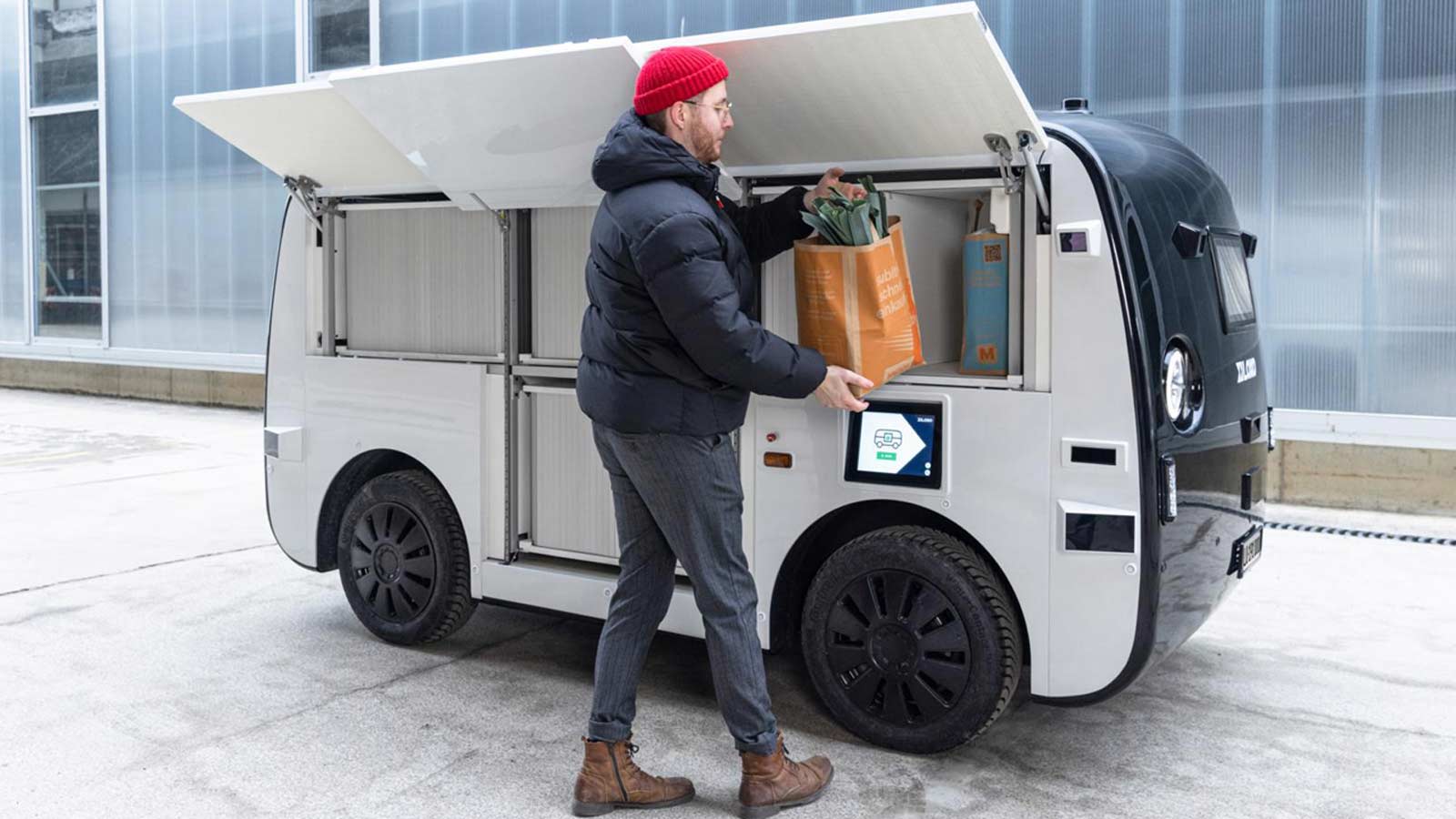The Extra Mile
Aug 5, 2023

At Schindler HQ in Switzerland, a pilot program is bringing an unexpected benefit to employees.
It’s the end of an exceptionally long workday, the refrigerator at home is all but empty and the absolute-last thing you want to do is fight crowds at the grocery store. For the more than 250 employees at Schindler’s headquarters in Ebikon, Switzerland, there’s another option: The groceries come to them. That’s thanks to a pilot program the global elevator OEM launched in February with Zürich-headquartered supermarket chain Migros and Swiss startup LOXO AG to test a new kind of delivery service called “Migronomous.” Migronomous is a self-driving vehicle powered by an electric motor, developed in Switzerland to bring groceries from a nearby Migros store to Schindler’s Ebikon campus. It represents the first time such an innovative delivery service vehicle has run on Swiss roads and, down the line, could hold promise for delivering actual elevator parts and components to customers. In the meantime, Schindler Senior Engineer Eliza Olczyk (EO) took the time to speak with your author (KW) via email about this very interesting project.
KW: When and how did this project come about?
EO: Schindler was approached by the Bern, Switzerland-based startup LOXO with a proposal for the pilot project. We had been exchanging ideas for some time on topics such as autonomous vehicles and “last-floor” delivery, where we discussed the future possibility of extended door-to-door delivery, including lift travel and distribution within buildings. The proposed pilot was a natural step toward our vision and a great opportunity for our partners to gain experience.
KW: The pilot program has been running for five months now (in June). What has the response from employees been like?
EO: The feedback has been very positive. We have regular orders and nearly every-day delivery. Many customers see it as a practical solution, saving them a trip to the grocery store after work. There is no need for extra travel or searching for a parking spot and shopping; they can pick up their groceries on the way to the car and go straight home. Moreover, as the pilot project is aimed at employees who travel to work by car, we’ve received requests for similar delivery directly to residential areas for those who travel to work via public transport. That shows the concept has potential with further applications.
KW: The press release says the vehicle will gradually become more and more independent until it is fully automated in the last project phase. Please tell me how this technology works and the target date for when it will be completely automated.
EO: Since the start of the project, a number of steps have already been taken toward vehicle autonomy. The vehicle is already driving fully autonomously on certain sections of its route, and full autonomy on the entire route is planned for June/July.
The vehicle was developed entirely by the young and promising start-up company LOXO. As Schindler was not involved, I cannot provide insight into the technology behind it. But, what I can say is that LOXO is working closely with Swiss federal roads authorities to ensure the safety and reliability of the system and help shape future regulations. The vehicle drives autonomously but is monitored by a tele-operation center. Trained personnel can intervene at any time, if needed. LOXO’s concept of tele-operation is an important step toward the future of delivery services.
KW: Describe the process of ordering items from Migros.
EO: Orders can be placed daily until 1 p.m. local time at our webshop, which was specially prepared for the pilot project. On the webshop, Schindler employees can select and place in a virtual shopping basket products from the Migros store at the Mall of Switzerland. Once the order is complete, a confirmation email is sent to the customer. Shortly before delivery, a Migros employee picks up the ordered products and places them in the LOXO vehicle. At this point, another e-mail is sent to the customer with a personal code to the vehicle’s compartment that contains their order. The order is delivered to the pick-up point at a multi-story car park on Schindler’s Ebikon campus, where it waits for the customer during a pre-defined time window between 4 p.m. and 6 p.m. Schindler employees can pick up the order at the most convenient time for them. They simply enter the code from the previously received e-mail at the vehicle display, and the corresponding compartment with their order is opened.

[Autonomous vehicles] could be a way of delivering small spare parts for maintenance or full lift component deliveries to the construction site or near hubs.”
KW: Is there a minimum order requirement?
EO: During the pilot, there is a minimum order value of CHF15 (US$16.50) and a maximum order value of CHF200 (US$220.80) per order. This is because the current boxes in the autonomous vehicle have only a limited capacity.
KW: Which types of items have been most popular? Do employees have the option to order, for example, prescriptions and medications or strictly groceries?
EO: The employee can only order products offered by the Migros branch at the Mall of Switzerland, which is still a large retailer with a wide range of products. However, the assortment is slightly limited for the first pilot. For example, no frozen or oversized products may be ordered. We were able to observe changes in order patterns during the pilot project. In the beginning, orders were dominated by office snacks, as the employees were experimenting with their first order. But, as time went on and the assortment was extended, more orders were placed for the home such as dairy products, bread and vegetables.
KW: Will this or could this become a permanent offering?
EO: Making it permanent at the Schindler Campus is currently not planned. The aim of the pilot project is to learn, gather experience and drive innovation together with our partners.
In terms of a permanent offering in Switzerland, it is conceivable by our partners to include autonomous vehicles in the strategy as a supplement to the existing solution. However, this is still open and depends on customer feedback and the results of the pilot project.
KW: Does Schindler foresee self-driving delivery for elevator and escalator parts? If so, when in the future could this happen?
EO: Autonomous driving technology is developing rapidly, opening up new opportunities for us. Companies and authorities are gaining more and more experience about its advantages, disadvantages and potential. So, self-driving delivery of components or spare parts could be a complementary option to other delivery solutions, or perhaps even an ultimate way at some point. It could be a way of delivering small spare parts for maintenance or full lift component deliveries to the construction site or near hubs.
There is much potential in this approach. But, whatever the future looks like, it depends not only on the technology but also on the environment. Will the autonomous vehicle be allowed to drive in normal traffic? Will there be any restrictions, such as time slot or load? Will city infrastructure be available for charging an autonomous vehicle?
There is still a lot to learn, but I personally believe that we will reach a point where autonomous driving is a reliable and safe alternative. And at that point, self-driving delivery of lift components would be a common solution.
Get more of Elevator World. Sign up for our free e-newsletter.









